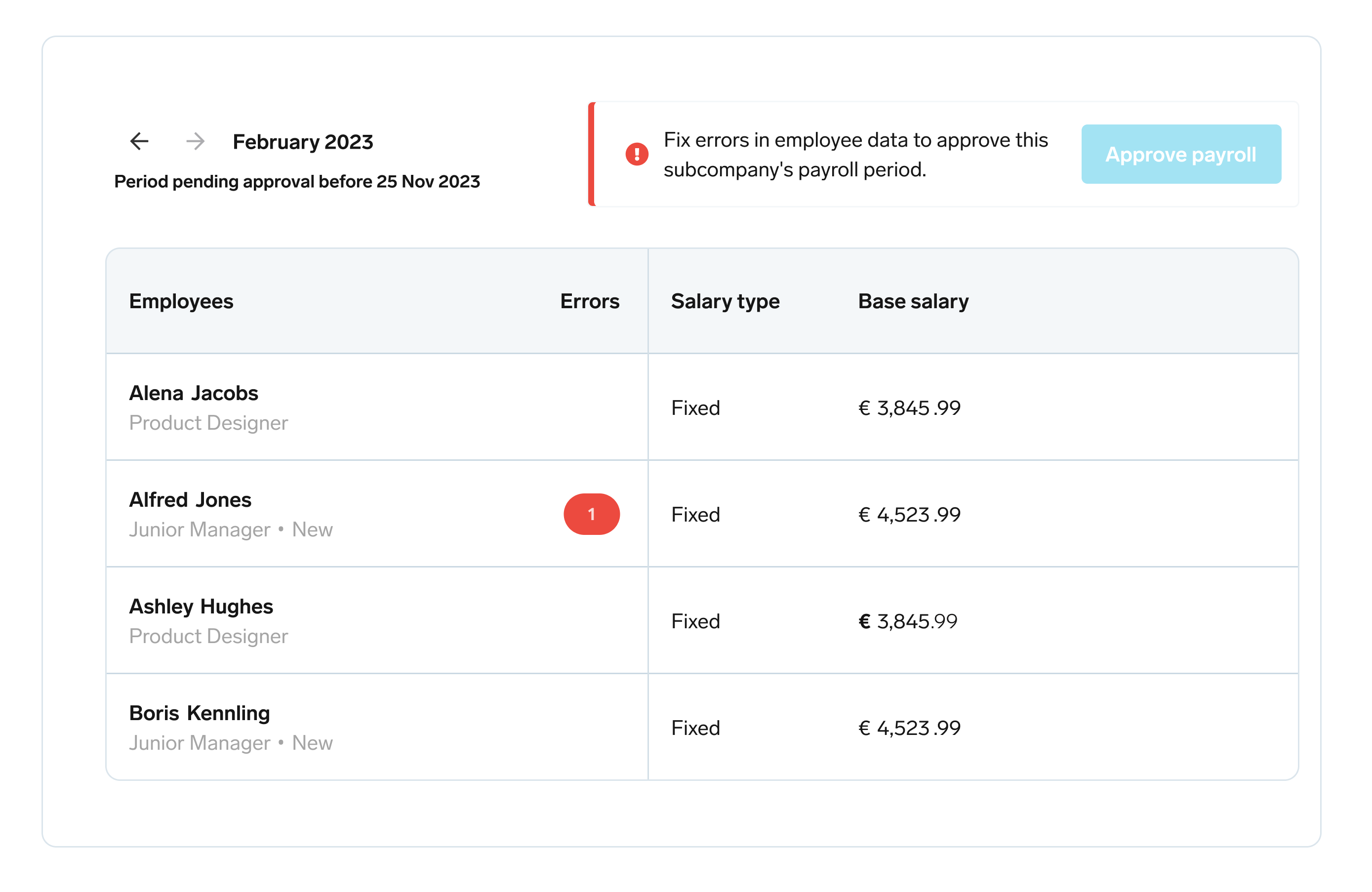
Start simplifying your payroll management
Learn how to streamline your payroll process to save time and ensure accuracy.
Read our guideWhat Happens When Sick Pay Runs Out in the UK?
After 28 weeks of Statutory Sick Pay (SSP), what happens when sick pay runs out? In this article, we explain all the technical aspects and offer a guide into what employers should do.
Track and report on absences across your organisation with Personio.What is Sick Pay?
Sick pay is the amount of salary or income paid to employees when they cannot work due to illness or injury. Sick pay must be at least the same as statutory sick pay or SSP (generally, £99.35 per week, up to 28 weeks). Employees can also receive their normal income as sick pay, or a percentage thereof, depending on their employment contract.
What is Statutory Sick Pay (SSP)?
In the UK, government support is offered for employees who are too sick to work. Employees are paid up to £99.35 per week for up to 28 weeks.
Who is Entitled to SSP?
As we covered in The Complete Guide to UK Long-Term Sick Pay, employees are entitled to receive SSP if they are sick for four continuous days or more. Employees must meet specific terms and conditions to be eligible for statutory sick pay (for example, they must earn an average of at least £123 per week). Some employees also don’t qualify for SSP.
How Long Can You Stay on SSP?
Employees can continue to receive statutory sick pay from the UK government for up to 28 weeks.
What is Employer Sick Pay?
Employer sick pay, also known as ‘sick pay entitlement’ in a contract, spells out what an employer will pay when an employee is sick.
There can be a big difference between what the government pays (SSP) and what an employer chooses to pay. Companies can include more generous leave packages in their employment contract and may even choose to include benefits like income protection insurance or sick pay insurance.
Company sick pay schemes can vary widely – but they must offer the legal minimum sick pay, at least. Often, employer sick pay schemes start after a probation period has been completed. They usually state that employees receive full payment for a set period of time and half-pay for a further period until sick leave becomes unpaid.
Who is Entitled to Employer Sick Pay?
Employees are entitled to employer sick pay as their contract states. However, employees are entitled to statutory sick pay if they are officially classed as an employee (note: the people who work for you can have different types of employment status), earn at least an average of £123 per week and have been ill for at least four days in a row (note: this includes non-working days such as weekends and even annual leave).
How Long Must an Employer Pay for Sick Leave?
According to government statute, employers must pay sick leave for up to 28 weeks, but some employers are more generous with their sick leave, choosing to pay more than the mandatory minimum amount.
For example, many employment contracts will provide a certain amount of sick leave at full pay, which then reduces over time until it reaches the SSP level, which ends after 28 weeks.
Review, approve and track absences from one place: Personio

Seamless absence management that scales with your headcount. See how Personio can manage every type of leave for your organisation today.
Absences with PersonioWhat Happens After Sick Pay Runs Out?
When the amount of leave an employer allocates contractually (employer leave) runs out, employees may still be entitled to further statutory sick pay (SSP). When SSP runs out, companies have a decision to make. Even if employees are sick for a long time, don’t forget that your behaviour towards them is still governed by a contract.
What Happens With Holiday Leave When Sick Pay Runs Out?
Remember: you must still pay an employee for their holiday entitlement, which continues to accrue when they’re off sick – even if it’s longer than 28 weeks. You could talk to your employee about using up holiday entitlement once sick pay runs out.
How Do People Get Money Once SSP Runs Out?
Once SSP runs out, employees might be eligible for government benefits, including universal credit or employment support allowance, regardless of whether they remain employed by you or not. If your employee’s SSP is ending, you must send them an SSP1 form.
Do Employers Legally Have to Pay Sick Pay?
Yes. Employers do have to pay sick pay, legally. You can offer more than statutory sick pay, but not less. The UK government has provided a helpful SSP employer guide which advises on what to do when an employee is off sick for between four days and 28 weeks. There is also a sick pay calculator you can use to work out how much to pay employees under different circumstances.
Frequently Asked Questions about Sick Pay
What Happens after 28 Weeks of Sick Pay Runs Out?
After 28 weeks, statutory sick pay runs out, and employers no longer have to pay sick pay. Employees can seek alternative income from government benefits, including universal credit or employment support allowance.
How Long Can Employees be on Sick Leave Before Dismissal?
There is no hard and fast rule about dismissing employees because of sickness. Employees can be fired for unauthorised absence and bogus sickness absence (or malingering) – but not necessarily long-term illness.
In some cases, contracts can be terminated “by reason of incapability” (according to lawble.co.uk). However, the employer must always act reasonably and follow a fair procedure before dismissing an employee.
How Long Can a Doctor Give a Sick Note for?
The government recommends that a sick note (or fit note) is provided for a clinically appropriate period of time. According to guidance provided to doctors by the Department for Work & Pensions, “in the first six months of a patient’s condition, a fit note can cover a maximum of three months. If a condition has lasted longer than six months, a fit note can be for any clinically appropriate period up to ‘an indefinite period’”. Employees must get a fit note after they’ve been sick for seven or more days.
Can an Employee Be Dismissed While on Sick Leave During a Probation Period?
An employee can be dismissed for many reasons during a probation period. As always, this depends on what’s included in their contract. If you can prove that an employee has not demonstrated the required behaviours, they will be in violation of their contract.
However, be warned! Long-term sickness is not necessarily grounds for dismissal. If you want to terminate an employee’s contract because they have been sick for an extended period of time, make sure you follow reasonable and fair processes to avoid being accused of discrimination.
How Does Your Organisation Track Sick Leave?
Tracking sick leave can be a rather cumbersome process, especially when you don’t have a proper absence management system in place. With Personio, your employees can request time off, furnish proof (like fit notes) and managers can approve and see them all from one place. No messy spreadsheets, no compromised data – everything you need, where you need it.
Consider starting a free 14-day trial of Personio, or speak with one of our HR experts, today.
